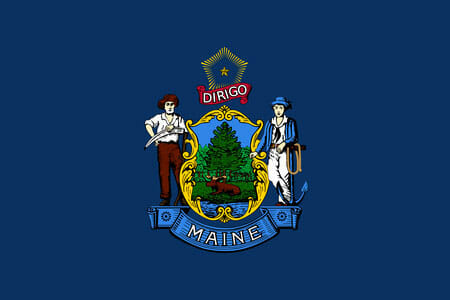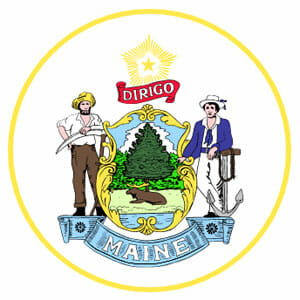Maine used to be a conservative state when it came to gambling, but the political climate around games of chance changed in the 2000s as new gambling-friendly regulations were passed. State lawmakers started by allowing slots at racetracks in 2004, but the push for more regulated gambling didn’t stop there, and in 2012 the first Maine casino opened its doors to the public.
Maine does not have a large gambling industry, but state gambling facilities do cover most of the essential bases. Gamblers are free to engage in pari-mutuel betting (legalized in 1935), to participate in lottery games (1973), to play bingo (1975), and to enjoy popular casino games and poker (2003).
State-sanctioned online gambling options are currently limited to paid-entry DFS contests. The state has legalized online sports betting, but regulations are still being drawn up and the market is not expected to launch until late 2023 or early 2024.
Maine Revised Statutes define gambling as “staking or risking something of value on the outcome of a contest of chance or a future contingent event, with the intent to receive something of value in the event of a certain outcome.”
The offense of unlawful gambling is defined as “intentionally or knowingly advancing or profiting from unlawful gambling activity,” language that targets the operator and not the player.
Most matters related to illegal gambling are covered in Maine Revised Statutes, Title 8: Amusements, and Sports.
The minimum gambling age is 18 for the lottery, bingo, and pari-mutuel betting, and 21 for casino-style games, including poker.
| Allowed | Notes | |
|---|---|---|
| Land-Based Gambling | Yes | Pari-mutuel betting and casinos |
| Online Gambling | Yes | DFS, horse race betting, and skill games are available |
| Lottery | Yes | |
| Charitable Gaming | Yes | Bingo only |
| Minimum Gambling Age | 18 for pari-mutuel, bingo, and lotteries; 21 for casinos |
Maine Casinos
Casino games were introduced to Maine in 2003 following a public referendum. Slot machines were approved in Bangor and Scarborough, but the residents of Scarborough voted against gambling in their city.
The Bangor facility was purchased by Penn National Gaming and is now known as Hollywood Casino Hotel & Raceway Bangor. In 2010, another gambling referendum authorized the construction of the Oxford Casino in Oxford, and in 2011, casino regulations were amended to allow table games at Bangor.
Racing enthusiasts are free to engage in parimutuel betting at the Bangor Raceway and Scarborough Downs and at four licensed OTB venues. Betting on greyhound races has been prohibited since 1993.
There are four federally recognized tribes in Maine, collectively the Wabanaki, but they are not allowed to operate casinos. That's because the Maine Indian Claims Settlement Act subjects them to state law. Thus, the federal Indian Gaming Regulatory Act does not apply in the Pine Tree State.
Maine residents do not have access to any state-sanctioned online casino options. Local regulations prohibit offshore sites from offering their services in Maine, but the law is directed at operators and those who promote gambling and not individual players.
Online Gambling in Maine
Maine has not regulated online casino gaming or poker, so for the time being, internet gambling enthusiasts have to stick to offshore sites.
The state's gambling laws are designed to target illegal operators rather than players, which means state residents and visitors won't be prosecuted for playing at online casinos that accept Maine players.
Maine legalized daily fantasy sports in August 2017. This is overseen by the state’s Gambling Control Unit.
The state has also legalized mobile sports betting, but the market is not up and running at the time of writing. Expect it to launch in late 2023 or early 2024.
Maine Sports Betting
Sports betting in Maine was legalized with a stroke of Gov. Janet Mills' pen in May 2022, but the market is yet to launch. The new law legalizes retail sports betting at the state's two casinos, while handing exclusivity on mobile sportsbooks to its four federally recognized tribes.
The Wabanaki tribes were recognized by a 1980 land settlements bill that gave them a narrower version of sovereignty than many Native American groups in other states. It denied them the gaming rights afforded to other tribes under the federal Indian Gaming Regulatory Act, and Maine’s new sports betting law is an attempt to partially redress the balance.
When the first online sports books launch in Maine, it will mark the first time the tribes have been able to pursue economic self-determination through legal gaming.
Maine Poker
Hollywood Casino Bangor owns the only live poker room in Maine. It operates four tables, which run No-Limit Hold’em daily with the stakes ranging from $1/$2 to $5/$10. The Bangor poker room also hosts $80 and $100 buy-in tournaments on Mondays, Wednesdays, Saturdays, and Sundays.
Home poker games are legal as long as no one is profiting commercially, i.e., by taking a rake.
Unfortunately, poker fans do not have access to any legal online poker sites in Maine. Offshore operators are prohibited from offering their services to Maine residents, but many do accept players from the state. Just as in the case of online casino play, the regulations are designed to penalize operators and not individual players.
Maine Daily Fantasy Sports
Maine passed a DFS bill in August 2017 when lawmakers agreed with DFS companies that their contests were games of skill, exempting them from Maine gambling laws. The law also established basic consumer protections, set a minimum age of 18 for players, introduced a licensing fee of $2,500 for companies with in-state revenue over $100,000, and prohibited contests based on collegiate and amateur sports. The oversight of DFS operators was given to the Gambling Control Unit within the Department of Public Safety.
Legal DFS platforms that are available to Maine residents include DraftKings, FanDuel, Yahoo DFS, and CBS Sports.
Maine Lotteries
The Maine Lottery offers both local and multi-state draw games, including Powerball, Mega Millions, Lucky4Life, and Lotto America. It also operates Instant Games and Fast Play games, with ticket prices ranging from $1 to $25. All tickets must be purchased from land-based retail agents as the lottery is not authorized to sell them online.
Maine Bingo
Maine regulations allow local non-profit organizations to host charitable bingo games. There is limited tribal bingo located on reservation land, the legality of which has long been contested. Maine businesses and charities are prohibited from operating online bingo sites. Any real-money online bingo platforms that offer their services to Maine residents do so illegally.
Maine Gambling FAQ
Does Maine have casinos?
Yes, Maine has two casinos, the Oxford Casino in Oxford and the Hollywood Casino Bangor in – wait for it – Bangor. These offer the full spectrum of slots and table games, including blackjack, craps, and roulette.
Does Maine have sports betting?
Not yet. While land-based and mobile sports betting were legalized in May 2022, the market is not expected to launch until late 2023 or early 2024.
Can I gamble online in Maine?
Yes, you can play DFS contests and soon you will be able to bet on sports via mobile apps. Online casino gaming and poker are unregulated in the state, although many offshore sites accept Maine customers.
Can I play poker in Maine?
Yes. You can play live poker at the Hollywood Casino Bangor. Private home games are legal provided no one profits commercially. Online poker is unregulated, but many offshore sites accept Maine customers.
Does Maine have a lottery?
Yes, the Maine Lottery was established in 1974 and joined the Muli-State Lottery Association in 2004. That means you can play games like Powerball and Mega Millions, as well as other draw and instant-win games.
Can I play slots in Maine?
Yes, land-based slots are available at the state's two casinos. Online slots are unregulated in the state, but many offshore casinos accept players from Maine.
Can I play table games in Maine?
Yes, the state's two land-based casinos each have a good selection of table games, including blackjack, roulette, craps, and many more. Online casino gaming is unregulated.
Maine Revised Statutes
Title 17-A: MAINE CRIMINAL CODE Part 2:
SUBSTANTIVE OFFENSES
Chapter 39: UNLAWFUL GAMBLING
§952. Definitions
As used in this chapter, the following definitions apply:
1. "ADVANCE GAMBLING ACTIVITY." A person "advances gambling activity" if, acting other than as a player or a member of the player's family residing with a player in cases in which the gambling takes place in their residence, he engages in conduct that materially aids any form of gambling activity. Conduct of this nature includes, but is not limited to, bookmaking, conduct directed toward the creation or establishment of the particular game, contest, scheme, device or activity involved, toward the acquisition or maintenance of premises, paraphernalia, equipment or apparatus therefor, toward the solicitation or inducement of persons to participate therein, toward the actual conduct of the playing phases thereof, toward the arrangement of any of its financial or recording phases, or toward any other phase of its operation. A person also advances gambling activity if, having substantial proprietary control or other authoritative control over premises being used with his knowledge for purposes of gambling activity, he permits that activity to occur or continue, or makes no effort to prevent its occurrence or continuation.
2. "Bookmaking" means advancing gambling activity by unlawfully accepting bets from members of the public as a business, rather than in a casual or personal fashion, upon the outcomes of future contingent events.
3. CONTEST OF CHANCE. "Contest of chance" means any game, contest, scheme or device in which:
A. A person stakes or risks something of value for the opportunity to win something of value;
B. The rules of operation or play require an event the result of which is determined by chance, outside the control of the contestant or participant; and
C. Chance enters as an element that influences the outcome in a manner that can not be eliminated through the application of skill.
For the purposes of this subsection, "an event the result of which is determined by chance" includes but is not limited to a shuffle of a deck or decks of cards, a roll of a die or dice or a random drawing or generation of an object or objects that may include, but are not limited to, a card or cards, a die or dice, a number or numbers or simulations of any of these. A shuffle of a deck or decks of cards, a roll of a die or dice, a random drawing or generation of an object or objects or some other event the result of which is determined by chance that is employed to determine impartially the initial order of play in a game, contest, scheme or device does not alone make a game, contest, scheme or device a game of chance.
4. "GAMBLING." A person engages in gambling if he stakes or risks something of value upon the outcome of a contest of chance or a future contingent event not under his control or influence, upon an agreement or understanding that he or someone else will receive something of value in the event of a certain outcome. Gambling does not include bona fide business transactions valid under the law of contracts, including but not limited to contracts for the purchase or sale at a future date of securities or commodities, and agreements to compensate for loss caused by the happening of chance, including but not limited to contracts of indemnity or guaranty and life, health or accident insurance.
5. "Gambling device" means any device, machine, paraphernalia or equipment that is used or usable in the playing phases of any gambling activity, whether that activity consists of gambling between persons or gambling by a person involving the playing of a machine. However, lottery tickets and other items used in the playing phases of lottery schemes are not gambling devices within this definition.
5-A. "Illegal gambling machine" means any machine, including electronic devices, however operated:
A. The internal mechanism or components of which when set in motion or activated may deliver or entitle the person playing or operating the machine to receive cash, premiums, merchandise, tickets or something of value;
B. That is used to advance gambling activity;
C. That is not a machine that a person may lawfully operate pursuant to a license that has been issued under Title 17, chapter 62 or that is operated by the Department of Administrative and Financial Services, Bureau of Alcoholic Beverages and Lottery Operations; and
D. That is not a slot machine registered pursuant to Title 8, section 1020 and owned by a slot machine distributor licensed pursuant to Title 8, section 1013.
6. "Lottery" means an unlawful gambling scheme in which:
A. The players pay or agree to pay something of value for chances, represented and differentiated by numbers or by combinations of numbers or by some other medium, one or more of which chances are to be designated the winning ones; and
B. The winning chances are to be determined by a drawing or by some other method based on an element of chance; and
C. The holders of the winning chances are to receive something of value.
7. "Mutuel" means a form of lottery in which the winning chances or plays are not determined upon the basis of a drawing or other act on the part of persons conducting or connected with the scheme, but upon the basis of the outcome or outcomes of a future contingent event or events otherwise unrelated to the particular scheme.
8. "Player" means a person who engages in social gambling solely as a contestant or bettor on equal terms with the other participants therein without receiving or becoming entitled to receive something of value or any profit therefrom other than his personal gambling winnings. "Social gambling" is gambling, or a contest of chance, in which the only participants are players and from which no person or organization receives or becomes entitled to receive something of value or any profit whatsoever, directly or indirectly, other than as a player, from any source, fee, remuneration connected with said gambling, or such activity as arrangements or facilitation of the game, or permitting the use of premises, or selling or supplying for profit refreshments, food, drink service or entertainment to participants, players or spectators. A person who engages in "bookmaking" as defined in subsection 2 is not a "player."
9. "PROFIT FROM GAMBLING ACTIVITY." A person "profits from gambling activity" if, other than as a player, he accepts or receives money or other property pursuant to an agreement or understanding with any person whereby he participates or is to participate in the proceeds of gambling activity.
10. "Something of value" means any money or property, any token, object or article exchangeable for money or property, or any form of credit or promise directly or indirectly contemplating transfer of money or property, or of any interest therein, or involving extension of a service, entertainment or a privilege of playing at a game or scheme without charge.
11. "Unlawful" means not expressly authorized by statute. An activity not expressly authorized by statute does not cease to be unlawful solely because it is authorized under federal law or the laws of another state or jurisdiction.
954. Unlawful gambling
1. Any person is guilty of unlawful gambling if that person intentionally or knowingly advances or profits from unlawful gambling activity.
1-A. A person is guilty of unlawful gabling if the person is under 21 years of age and plays a slot machine as defined in Title 8, section 1001, subsection 39.
2. Unlawful gambling is a Class D crime. [Editor's Note: A Class D crime is punishable by one to three years in prison.]
3. A person convicted of a violation under this section must forfeit to the State all income associated with that violation.





